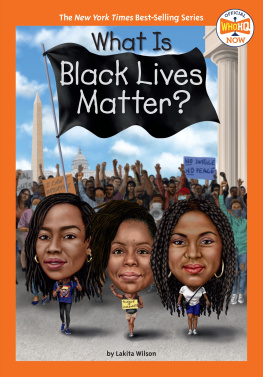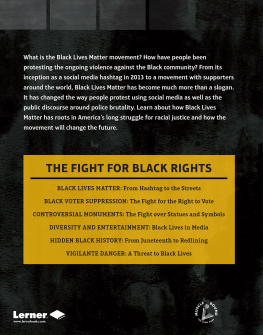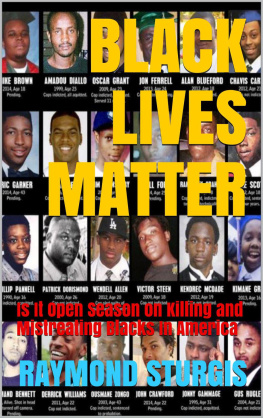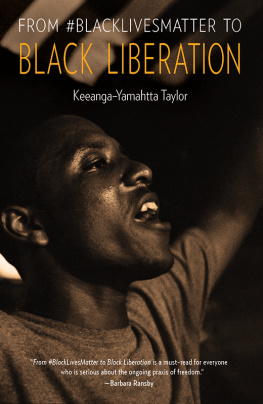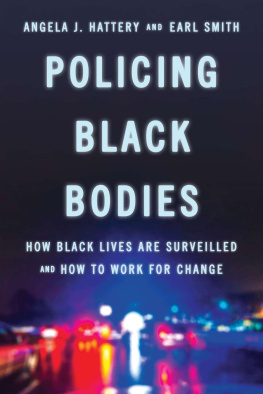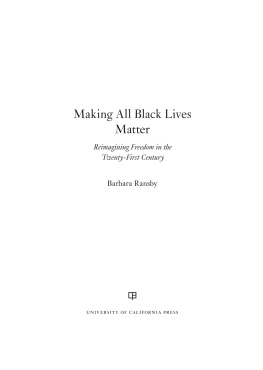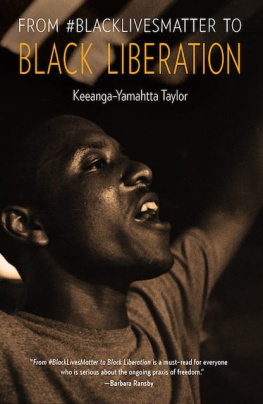University of California Press
Oakland, California
2019 by Andrea S. Boyles
Library of Congress Cataloging-in-Publication Data
Names: Boyles, Andrea S., 1973 author.
Title: You cant stop the revolution : community disorder and social ties in post-Ferguson America / Andrea S. Boyles.
Description: Oakland, California : University of California Press, [2019] | Includes bibliographical references and index. |
Identifiers: LCCN 2019002897 (print) | LCCN 2019015884 (ebook) | ISBN 9780520970502 (ebook) | ISBN 9780520298323 (cloth : alk. paper) | ISBN 9780520298330 (pbk. : alk. paper)
Subjects: LCSH : Police-community relationsUnited States21st century. | Police brutalityUnited States21st century. | African AmericansViolence againstUnited States21st century. | Protest movementsUnited States21st century.
Classification: LCC HV 7936.p8 (ebook) | LCC HV 7936.p8 b695 2019 (print) | DDC 363.2/3dc23
LC record available at https://lccn.loc.gov/2019002897
Manufactured in the United States of America
28 27 26 25 24 23 22 21 20 19
10 9 8 7 6 5 4 3 2 1
And yet her legacy lives...
I dedicate this book to my late mother, Brenda, who embodied immeasurable resilience through life and death, and to my children, Prentis Jr., Anaiah, and Faith, as the next generation of hope, determination, and accomplishment.
I also dedicate this book to the innumerable black citizens, volunteers, community and grassroots organizers, and leaders of color in general, who selflessly and innovatively work in the trenches and on the front lines of disparity, with little to no resources or fanfare, in service to disproportionately destitute, oppressed populations and places.
Acknowledgments
This is my second book. The fact that I raised the stakes to compete against myself made this journey even more tedious than the first one. The idea had been to work more innovatively, furthering theoretical implications, evidence-based data, and opportunity for provoking social change. However, this venture was compounded by the unimagined intricacies of an emerging twenty-first-century black social movement. As a black female St. Louisan sociologist and critical criminologist, from the outset my mission was to accurately and holistically account for the Ferguson civil unrest and uprisingboth events and interactions. I wanted to get things right, wanted to capture the realness of events and experiences from the perspectives of those closest to, most subject to, and most affected by them. Further, my goal was to do this from within the movement, alongside my fellow black citizens. Our lives meant and continue to mean more than a series of headlines or evolving news cycles. No pressure from me for me (sarcasm), but I felt obligated to work in tandem with the drive and commitment of the people. Black citizens went hard immediately following Mike Brown Jr.s death. Therefore, it was in this spirit that my three-year journey began. Only hours after Browns death on August 9, 2014, I responded to an empirical call to action, influenced by community organizers, and I stayed the course, with a twofold agenda centered on black victimization. This course of action meant fully yielding to examinations and explanations while immersed in a steady flux of social conflict and a nonnegotiable demand for social changelocally, nationally, and internationally.
Accomplishing this feat meant that I needed and would have to rely on a sizable support system. Given the far-reaching implications and effects of civil unrest in the region, I would like to begin by first thanking Lindenwood Universityboth the Belleville and St. Charles campuses. Administrators, colleagues, and students alike were supportive of my research and writing agenda, pre- and post-Ferguson. I am grateful to the administrators and colleagues who regularly checked on me while I was immersed in protests (i.e., direct action). I am also appreciative of administrators, faculty, and staff with the Hammond Institute, who provided incentives for participants as well as research assistants. Since many interview participants resided in disadvantaged neighborhoods, I badly wanted to give back to them for their time spent giving to me; some of the most sensitive, indelible experiences and stories were shared through voluntary interviews. Likewise, I am grateful to my research and student assistants, Melissa Allen, Alyssa Flynn, Quinisa Grant, and Arron Whitt, for transcribing some field notes and interviews, (re)reading transcripts and materials for accuracy, and assisting with other relevant tasks. For years I juggled the interchangeable and overlapping demands of fieldwork and campus work. More specifically, I personally acquired all 125 of my citizen contacts through participant observation, in-depth interviews, and focus groups. I also coded most of the data and completed most of the research process by myself. Therefore, I wholeheartedly appreciated course releases, flexibility, and patience. I am also thankful to my colleague Trisha Prunty for continuously providing institutional review board assistance and to campus graphic artist Lennon Mueller for his assistance with the images in the book.
Further, I am appreciative of Rod Brunson. Rod has always been an objective, avid supporter of my research agenda and a critical reviewer of my work. I am grateful to him for being a mentor, colleague, and friend, whose work ethic and discipline have been exemplary for me. Since the beginning of my academic career, I have increasingly found myself adopting some of his catchphrases and approaches while navigating research and publishing. Unbeknown to him, I routinely deferred to his wisdom while working on this project. Our periodic conversations and his advice encouraged and strengthened me in my resolve and my commitment to this study. Fieldwork proved especially physically, mentally, and emotionally exhausting. His availability and willingness to be a sounding board and academic safe space for my critical and perhaps racing (LOL) thoughts and ambitious ideas and actions have been invaluable. His expertise and camaraderie provided much-needed support, particularly during tumultuous events and exchanges across the St. Louis region. It has meant the world to me that throughout the duration of this study, he allowed me to decompress or debrief without judgment following direct action, community events, interviews, and more. For that and more, Rod, I extend to you much gratitude.
I am also grateful to the University of California Press, especially my editor, Maura Roesner. I appreciate that we have developed a wonderful working relationship over the years. Maura respects and trusts my expertise, my professional and personal intuitiveness, and my ability to navigate timely, critical issues and terrain innovatively and effectively. I value that she has always been superexcited about my work. This has mattered most at times when I risked the ability to appreciate the depth of the study while intently concentrating on process (e.g., data collection, analysis, deadlines). I am thankful for Mauras uncanny ability to bring me full circlehow you, Maura, would meticulously say and do things that rejuvenated and reinvigorated my sense of the missionto reach and complete the underlying goals and agenda of the study.


